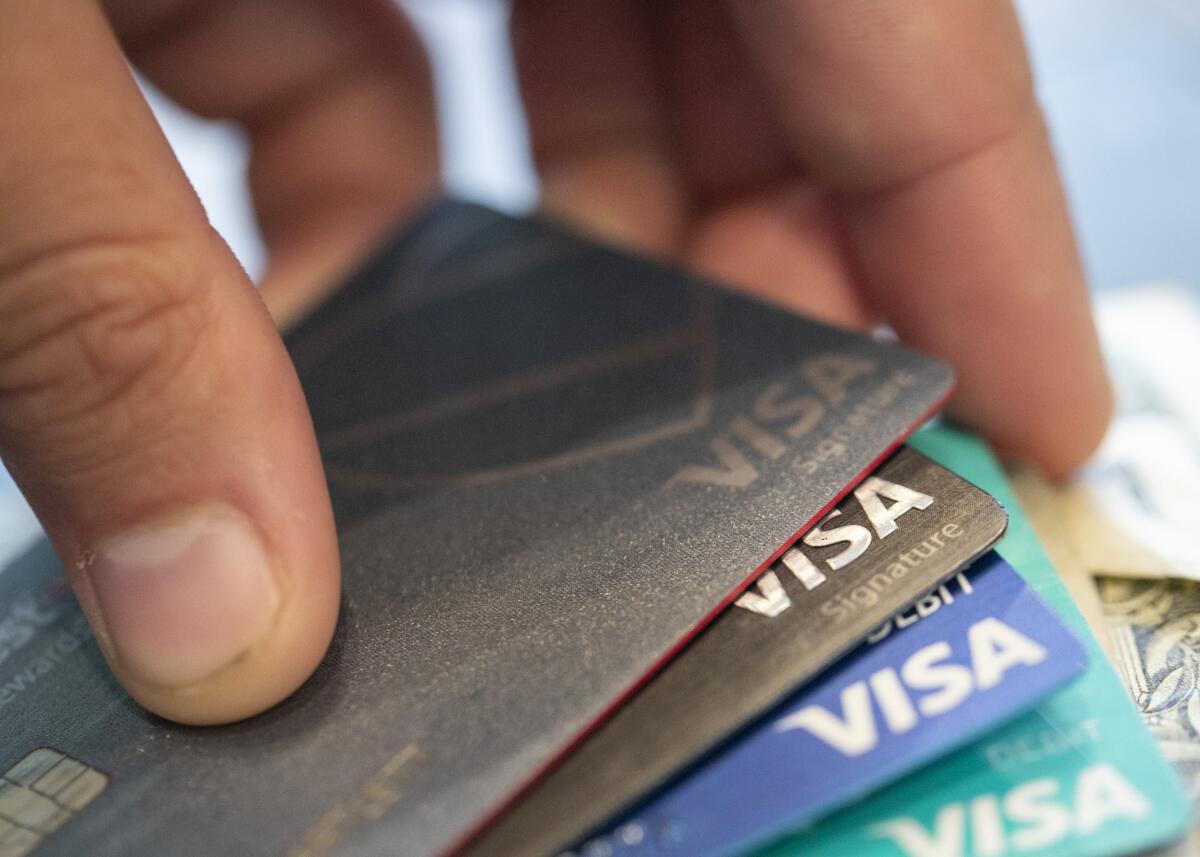Why home equity loans are a better option than credit cards

- Share via
Dear Liz: My husband is 68, I am 70, both of us are retired and on Social Security. We have little in savings. My husband wants to charge $10,000 to a low-interest credit card to pay for a new furnace and water heater. He plans to pay the minimum each month and at the end of each year transfer the balance to a different credit card with low interest. Is this a good idea?
Answer: You may have better options.
Many credit cards offer low introductory rates that expire after 12 to 21 months, but you typically won’t know before you apply what your credit limit will be.
You may not get a high enough limit to make all your purchases or you could use up so much of the limit that it causes damage to your credit scores. (Scoring formulas are sensitive to how much of your available credit you’re using, and ideally you wouldn’t use more than about 10% to 30% of your credit limits at any given time.) When you apply to transfer your balance to another low-rate card, you’ll run similar risks.
A home equity line of credit or home equity loan might be a better choice. HELOCs have variable rates, but you would have a source of funds you can tap and repay as needed (much like a credit card, but backed by the equity in your home). Home equity loans typically have fixed terms and rates, so you can borrow what you need and pay off the debt over time (often 15 to 20 years).
If paying back the money would be a hardship, a reverse mortgage might be an option. Reverse mortgages can be complicated and expensive, however, so talk to a housing counselor approved by the Department of Housing and Urban Development before proceeding with one.
An L.A. man says he’s receiving as many eight calls a day from a telemarketer called Quantum 3 Media. Trying to reach the company is near impossible.
Storing will and trust documents
Dear Liz: You recently advised a person to leave their original will or trust with their attorney. As a practicing attorney, I cannot tell you how many times original wills and trusts have been lost as the attorney that prepared the documents retired or died before the client. There are requirements to inform clients of a retirement, but very few lawyers follow those rules, unfortunately. The best thing is to buy a home safe or put the documents in double zip-close freezer bags in your freezer (which should be fireproof and is a great preserver of the documents). Or, hire a younger lawyer who will still be around when you want to amend your will or trust or you pass away.
Answer: Thanks for sharing your perspective, but freezers are not fireproof. A fireproof home safe would be a better option for those who want to keep their wills at home.
There is, unfortunately, no one perfect option for storing wills. You’re quite right that people often don’t stay in touch with the attorneys who create their documents, even though estate plans should be reviewed and updated regularly. The risk of losing a will may not be as high if the attorney is part of a large firm, but even those can go out of business.
Some states allow you to file your will in advance with the probate court or a registrar of wills, so that’s another avenue to consider.
The job-gain narrative is competing with the inflation narrative in assessments of the economy, and the inflation narrative is winning.
Safe deposit box shortcomings
Dear Liz: You recently advised against keeping one’s will in the bank safe deposit box. That was on the grounds that upon death, the bank could seal the box. My daughter is named on my box (she is also named as executrix) — that is, the bank ran her through several hoops, and the result is she can gain access to the box as she wishes. Does your advice hold in this case?
Answer: Find out what the bank’s policy is. If the bank confirms your daughter will have access in the event of your death, ask that the assurance be put in writing.
One problem with keeping anything in a safe deposit box is that the contents can be escheated — turned over to the state — if the bank decides the box has been abandoned. That usually won’t happen if you’re paying the bill for the box on time and making sure the bank has up-to-date contact information, but physically checking the box’s contents once a year or so is a good practice.
Liz Weston, Certified Financial Planner, is a personal finance columnist for NerdWallet. Questions may be sent to her at 3940 Laurel Canyon, No. 238, Studio City, CA 91604, or by using the “Contact” form at asklizweston.com.
More to Read
Inside the business of entertainment
The Wide Shot brings you news, analysis and insights on everything from streaming wars to production — and what it all means for the future.
You may occasionally receive promotional content from the Los Angeles Times.












